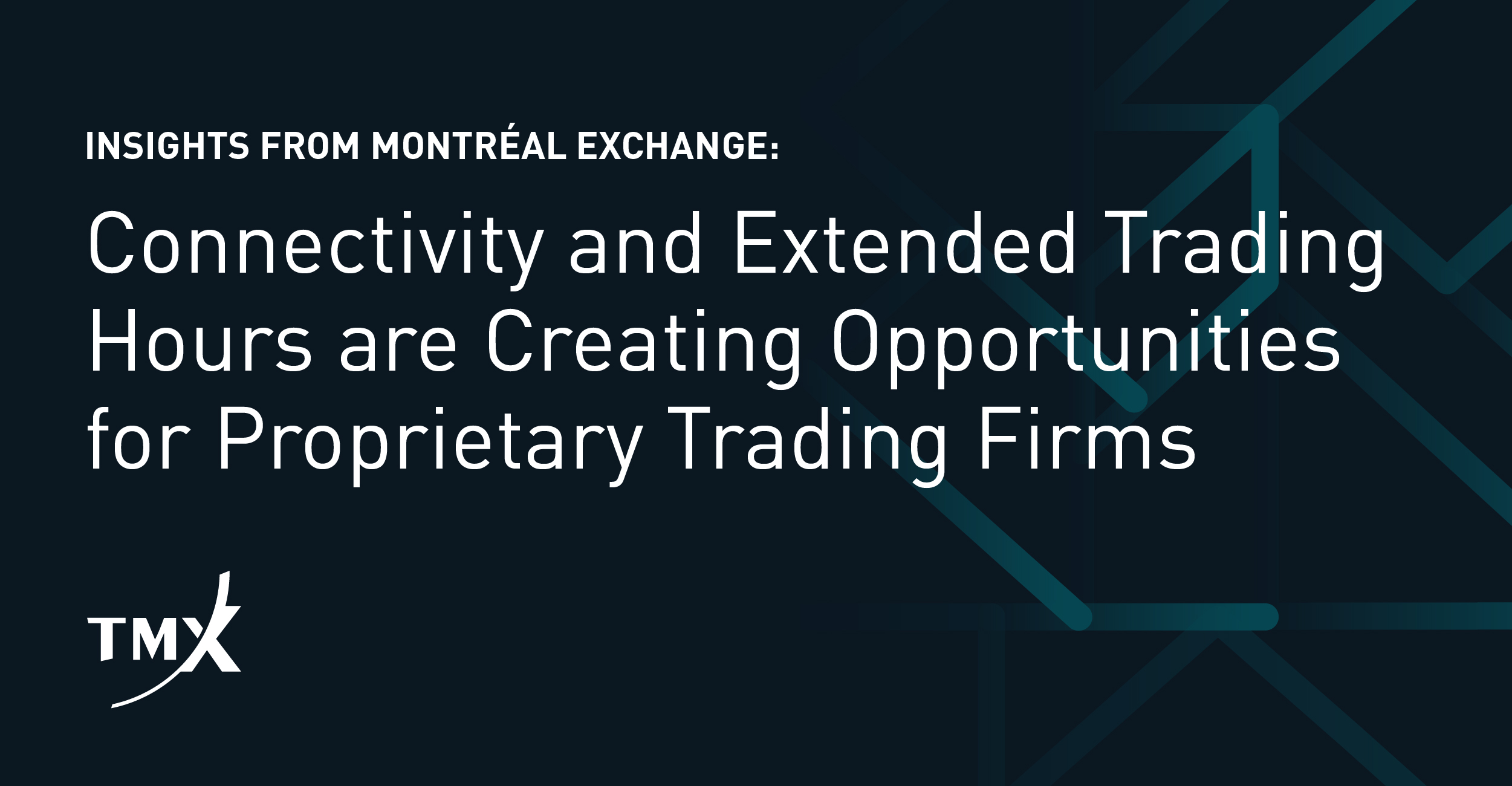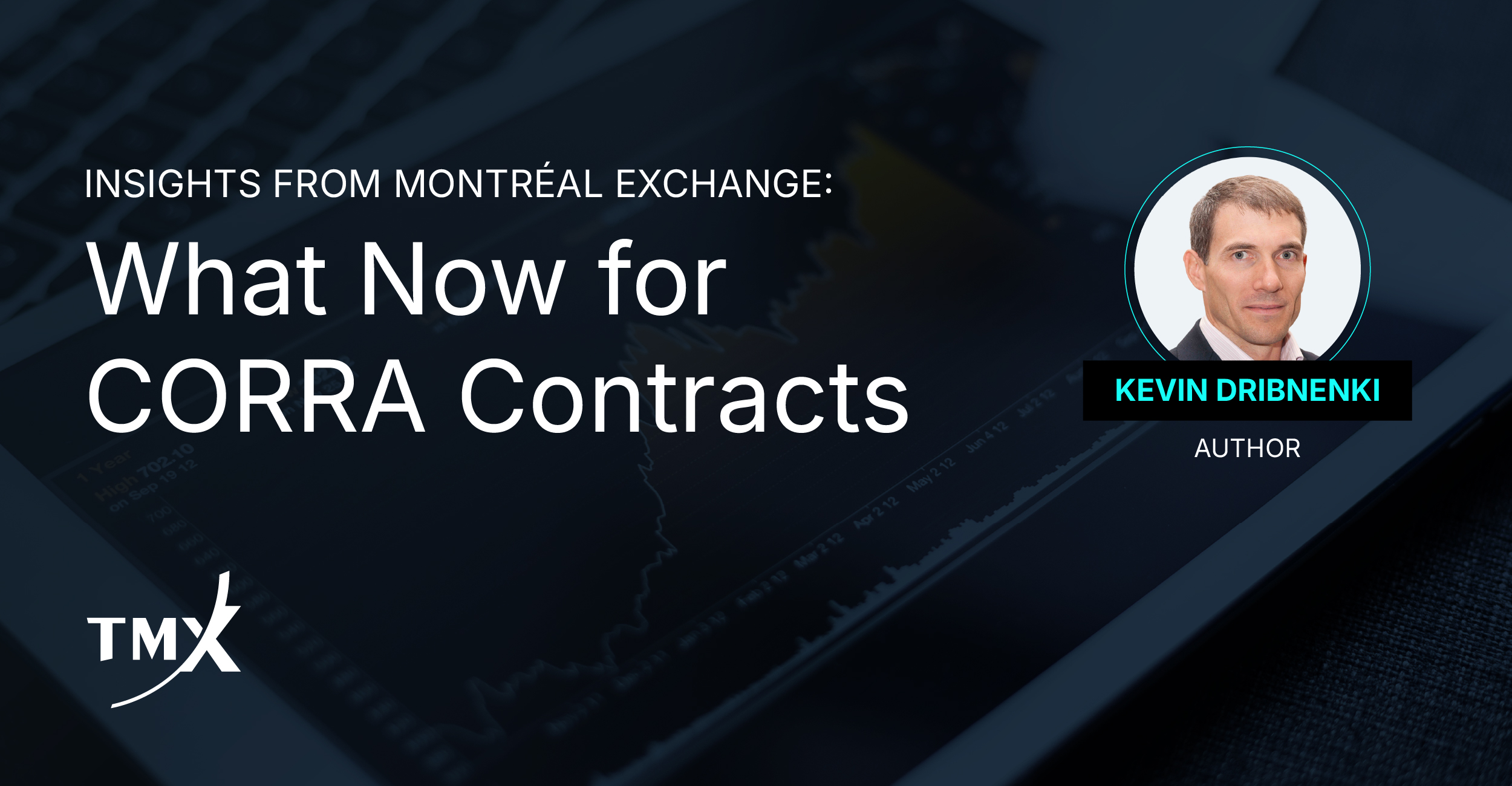Connectivity and Extended Trading Hours are Creating Opportunities for Proprietary Trading Firms

In 2018, Montréal Exchange (MX) extended its trading hours to meet the needs of investors in Europe wanting to access Canadian listed derivatives. In 2021, MX will further extend opening hours to offer investors in Asia Pacific the opportunity to trade Canada in their local time. This will result in the Exchange being open for business for over 20 hours per day to meet demand from international investors.
Mercury Derivatives Trading Limited (MDT), a proprietary trading firm that provides services in global derivatives markets, has been a client of Montréal Exchange for almost 15 years. It operates in markets across 6 continents. The firm opened an office in Montréal to support their expansion. We asked MDT for their perspective on global derivatives trading and extended trading hours.
MX: In your view, what are the characteristics of a globally connected capital market ecosystem?
MDT: We believe the characteristics of a globally connected and frictionless capital market ecosystem are low barriers to entry and low barriers to information, especially in the futures market. Technology has certainly facilitated this trend, with electronic trading platforms making it possible for firms like ours to have operations outside of traditional financial centres.
Decreasing barriers to entry will enable a new generation of traders, investors and/or speculators to quench their appetite for risk. It will also help market participants derive more value from capital markets, which in turn will enrich the ecosystem through increased volume and liquidity.
MX: What does MDT look for in the markets where it has trading activities?
MDT: An efficient and effective exchange must have several types of participants, such as market makers to provide liquidity, retail and institutional investors to drive volume, and clearing firms to facilitate derivatives trading. This, combined with ensuring that everyone has the same market data information at the same time, fair trading practices and a consumption-based cost of market data (as opposed to flat rising costs), results in a more cohesive and well-functioning market.
In our experience, changes to Montréal's Exchange's market making programs in recent years has resulted in a much healthier marketplace and that brings a lot of value for our business. The management team is also very proactive in terms of listening to market participants and trying new things based on that feedback. Compared to other markets around the world, Montréal Exchange is strongly focused on innovation and continuously expands its product suite to address investor needs.
MX: What aspects of Montréal Exchange's derivatives products are aligned with your investment strategy?
MDT: We started in 2002 trading short-term interest rates such Euro-Dollar, Euro-LIBOR and Short Sterling. By 2007, we were expanding into other markets with similar products, enough liquidity and, where there is a deep yield curve that allows us to create sophisticated strategies such as spread trades, butterfly swaps and bundles. Montréal Exchange's Three-Month Canadian Bankers' Acceptance Futures (BAX) contract was a good fit for that approach.
In addition, the Canadian yield curve is liquid throughout, whether you're looking at the 2-year or 5-year point. As a result, we've seen volumes on Montréal Exchange grow over time and have expanded our investments to include fixed-income products such as Ten-Year Government of Canada Bond Futures (CGB). We're also now exploring equity and index derivatives, as well as Canadian Dollar Offered Rate (CDOR) futures.
MX: Why is it important for your business to have access to extended trading hours?
MDT: Since we are involved in global markets, the most important added value to having extended hours is the opportunity to mitigate risks. In the past when the Canadian market was closed for 14 hours a day, should a big event occur, most market participants with exposure in the Canadian futures market would hedge their risk in the US and wait for the Canadian markets to reopen to unwind.
Every time there is a change in the market dynamic, new sources of opportunity are created that didn't exist before. On the one hand, it can be challenging to manage trading around the clock and carry reasonably large order books and positions. Liquidity is spread out over a longer period of time, and there can be less additional volume increment. On the other hand, extended trading hours will allow us to implement inter-market strategies with a higher degree of confidence as well as increase activity for our algo trading platform.
MX: As the future of work evolves post-pandemic, how does this affect proprietary trading firms and other market participants?
MDT: More and more people are starting to accept the idea that one doesn't need to be physically present in financial centers to participate successfully in capital markets. The world of capital markets will evolve and converge toward the new workplace standards. This has been our model for more than 15 years, even before the industry realized that work-from-home was possible.
The rise of technology has allowed us to take advantage of talent that can be based anywhere in the world. However, a geo-agnostic workforce and working from the office are balanced with the need to be in place to preserve company culture. Our office in Montréal is a diverse group, with research analysts, quant developers, HR and branch managers. There is deep collaboration, as information is shared and our traders learn from and stay connected with colleagues across the globe. This in turn helps them push the limits and keep growing outside of their comfort zones.
Copyright © 2021 Bourse de Montréal Inc. All rights reserved. Do not copy, distribute, sell or modify this document without Bourse de Montréal Inc.'s prior written consent. This article is provided for information purposes only. Neither TMX Group Limited nor any of its affiliated companies guarantees the completeness of the information contained in this article, and we are not responsible for any errors or omissions in or your use of, or reliance on, the information. This article is not intended to provide legal, accounting, tax, investment, financial or other advice and should not be relied upon for such advice. The information provided is not an invitation to purchase securities listed on Montréal Exchange, Toronto Stock Exchange and/or TSX Venture Exchange. TMX Group and its affiliated companies do not endorse or recommend any securities referenced in this publication. BAX, CGB, CDOR Montréal Exchange and MX are the trademarks of Bourse de Montréal Inc. TMX, the TMX design, The Future is Yours to See., and Voir le futur. Réaliser l'avenir. are the trademarks of TSX Inc. and are used under license.



